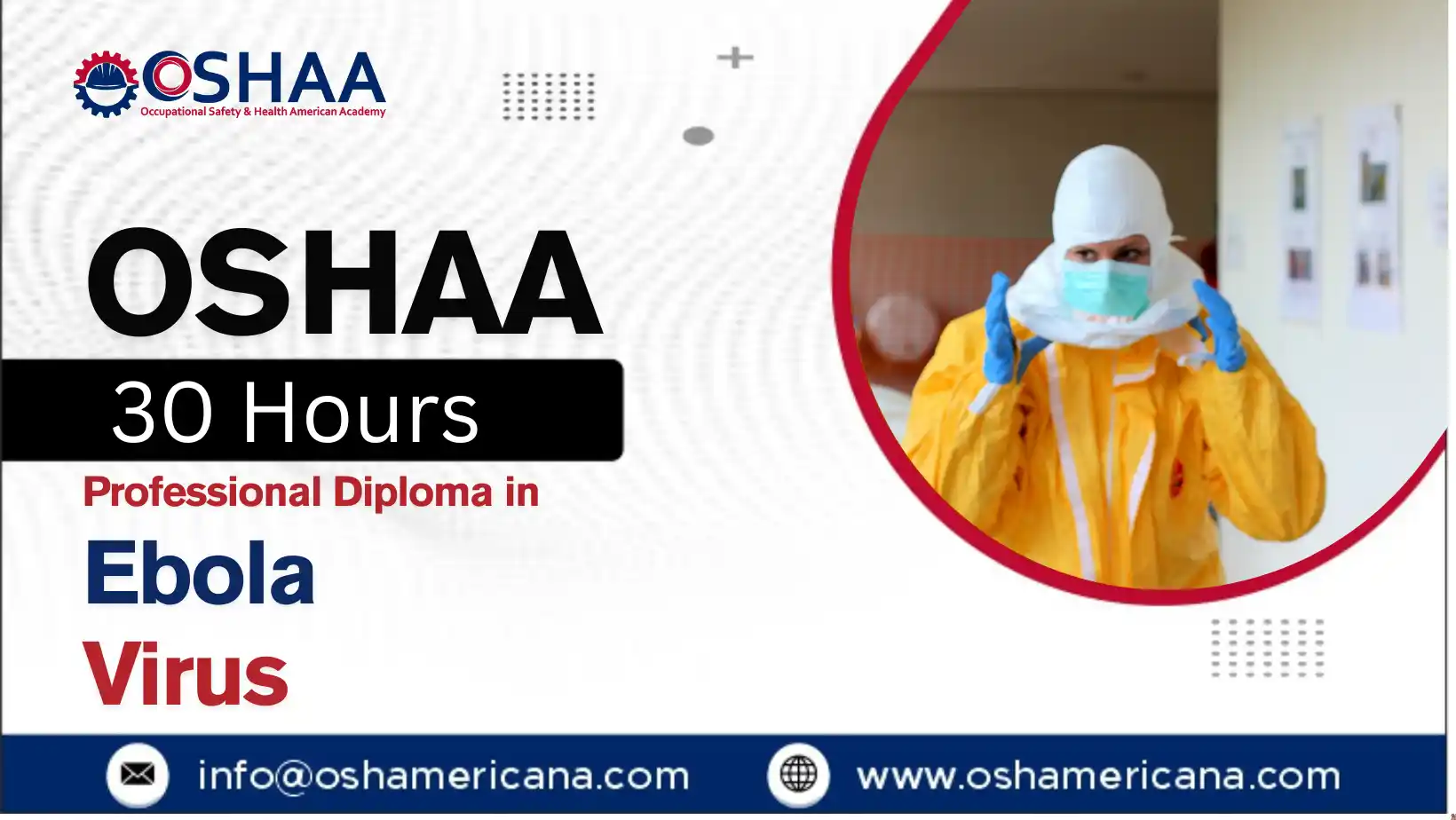Ebola virus disease (EVD) remains one of the most serious and deadly infectious diseases affecting global health security. With its high fatality rate and potential to cause severe outbreaks, the importance of accurate knowledge, swift response, and evidence-based containment strategies is paramount. The OSHAA 30-Hours Professional Diploma in Ebola Virus is designed to provide participants with a comprehensive understanding of this high-risk pathogen, its transmission dynamics, clinical management, and preventive approaches.
The programme consists of 30 structured learning hours, divided into focused study units that explore every critical aspect of Ebola virus disease. From the origins and virology of the Ebola virus to the latest advancements in diagnostics, treatment protocols, and outbreak response, the course presents a scientific and globally informed view of EVD.
This diploma provides a solid foundation for understanding the complexities of Ebola virus disease and prepares participants for roles where accurate knowledge and swift decision-making are essential. It strengthens the capacity to contribute to outbreak response efforts, infection control protocols, and public health planning.
The OSHAA 30-Hours Professional Diploma in Ebola Virus is ideal for participants working or aspiring to work in healthcare, public health, epidemiology, humanitarian aid, or laboratory sciences. It is also well-suited to those involved in health education, emergency response, and global health policy.
The fight against Ebola virus disease requires informed and prepared professionals who understand the science, the risks, and the response measures required. The OSHAA 30-Hours Professional Diploma in Ebola Virus delivers this expertise through a professionally structured, accessible programme that empowers participants to make a difference in global health preparedness and infectious disease management.
OSHAA 30-Hours Professional Diploma in Ebola Virus
Study Units
Learning Outcomes
Introduction to Ebola Virus and Historical Outbreaks (3 hours)
- Describe the discovery and evolution of the Ebola virus over time
- Identify major historical outbreaks and their global impact
- Recognise the geographical regions most affected by Ebola
- Analyse the public health responses to previous epidemics
Virology and Pathogenesis of Ebola Virus (3 hours)
- Explain the biological structure and classification of the Ebola virus
- Understand the replication cycle and mechanisms of infection
- Describe the immune system’s response to Ebola infection
- Discuss the factors contributing to disease severity and mortality
Transmission Dynamics and Risk Factors (6 hours)
- Identify routes of Ebola virus transmission in various settings
- Evaluate individual and community-level risk factors
- Examine the role of healthcare environments in disease spread
- Assess the influence of cultural practices on transmission rates
Clinical Presentation and Diagnostic Methods (3 hours)
- Recognise the signs and symptoms associated with Ebola virus disease
- Differentiate Ebola from other febrile illnesses through clinical features
- Understand laboratory techniques used in Ebola diagnosis
- Interpret diagnostic criteria and confirmatory testing protocols
Case Management and Supportive Treatment Strategies (4 hours)
- Outline the principles of supportive care for Ebola patients
- Understand fluid management, symptom relief, and complication prevention
- Evaluate emerging therapeutic options and clinical trial results
- Recognise the importance of isolation and monitoring protocols
Infection Prevention and Control Measures (6 hours)
- Identify key infection control strategies in clinical and community settings
- Apply WHO and international guidelines for outbreak preparedness
- Implement decontamination, waste disposal, and hygiene procedures
- Understand the role of contact tracing and quarantine measures
Personal Protective Equipment (PPE): Use and Protocols (2 hours)
- Demonstrate correct procedures for donning and doffing PPE
- Select appropriate PPE for different levels of exposure risk
- Understand the limitations and challenges of PPE in outbreak settings
- Promote safety protocols to reduce risk of occupational exposure
Public Health Response and Outbreak Containment (3 hours)
- Explain the steps involved in a coordinated outbreak response
- Understand the role of government and international health agencies
- Evaluate community engagement strategies for effective containment
- Discuss surveillance, reporting, and rapid response frameworks
Course Benefits: OSHAA 30-Hours Professional Diploma in Ebola Virus
- Provides a comprehensive understanding of the Ebola virus, including its biology, transmission, and clinical impact
- Equips participants with the skills to identify, manage, and respond to suspected and confirmed Ebola cases
- Enhances knowledge of global outbreak history and lessons learned from past public health responses
- Develops competence in infection prevention and control practices in high-risk environments
- Trains participants in the safe and effective use of personal protective equipment (PPE)
- Strengthens ability to support outbreak containment through surveillance, isolation, and community engagement
- Offers practical insights into diagnostic tools, case management strategies, and treatment protocols
- Builds awareness of ethical, cultural, and logistical considerations in responding to Ebola emergencies
- Adds value to careers in healthcare, public health, humanitarian aid, and infectious disease research
- Contributes to global health preparedness by promoting evidence-based practices and professional responsibility
The OSHAA 30-Hours Professional Diploma in Ebola Virus is designed for participants seeking specialised knowledge in infectious disease control and outbreak management. It is particularly suitable for:
- Participants working in healthcare, nursing, or clinical support roles
- Public health professionals involved in disease surveillance and emergency response
- Humanitarian aid workers and volunteers operating in high-risk regions
- Laboratory technicians and researchers focusing on virology or tropical medicine
- Health and safety officers responsible for infection control procedures
- Policy advisors and health educators promoting global health preparedness
- Participants preparing for deployment to regions affected by viral haemorrhagic fevers
This course is ideal for anyone committed to strengthening their role in the prevention, detection, and management of Ebola virus disease, whether in clinical, field, or policy-based settings. No prior specialist training is required, but a foundational interest in infectious diseases and public health is recommended.







